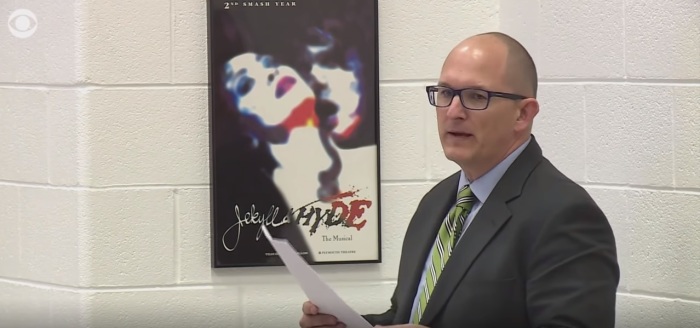Virginia Supreme Court sides with teacher fired for refusing to use trans pronouns

The Virginia Supreme Court has revived a lawsuit filed by a public high school teacher fired for refusing to use the preferred pronouns of a trans-identified student.
In an opinion released Thursday, Virginia's highest court reversed a circuit court decision against Former French teacher Peter Vlaming of West Point High School and remanded the case surrounding his dismissal to the lower court for further proceedings.
In 2018, Vlaming was fired for refusing on religious grounds to not refer to a biologically female student with male pronouns, having offered to refer to the student by a male name and not use feminine pronouns as a compromise. The school district accused him of engaging in discrimination based on the student's gender identity.
Vlaming filed a complaint against school officials in 2019, with the King William Circuit Court rejecting his lawsuit, prompting Vlaming to appeal to the state supreme court in 2021.
Virginia Supreme Court Justice D. Arthur Kelsey authored Thursday's opinion, saying that Vlaming had "a legally viable claim" that the school board violated his religious liberty.
"The circuit court erred in dismissing this claim," wrote Kelsey. "We understand, as everyone does, that some limiting principle on this textually unqualified right must be recognized."
"With equal certitude, however, we know that the limitation cannot simply be to 'keep your religion to yourself.' It would be alarming indeed to think that in the Commonwealth of Virginia, a religious person needs a constitutional right merely to hold a silent belief or opinion that does not change a thing he does or does not do."
Kelsey argued that "Vlaming had an intangible property interest in his continued employment and a corresponding right not to be terminated without just cause." The justice stressed that "religious liberties in this Commonwealth do not vanish simply because a purely secular law says so."
"In sum, the circuit court erred when it dismissed this case based solely on a review of the pleadings. Accepting arguendo that the allegations in the complaint are true, as we must because of the posture of this appeal, Vlaming has asserted legally viable claims under the Constitution of Virginia, the [Virginia Religious Freedom Restoration Act], and common-law contract principles," Kelsey concluded.
Justice Thomas Mann authored an opinion dissenting and concurring in part, joined by Chief Justice S. Bernard Goodwyn and Justice Cleo Powell for certain portions.
Mann wrote that while he agreed that the circuit court decision should be reversed and remanded, he also thought that the majority's standard of religious liberty protection was problematic.
"Regarding Vlaming's free-exercise claim, the majority establishes a sweeping super scrutiny standard with the potential to shield any person's objection to practically any policy or law by claiming a religious justification for their failure to follow either," Mann claimed.
"Justice Antonin Scalia, writing on behalf of the Supreme Court of the United States, warned that interpreting a free exercise clause so broadly would permit an individual 'to become a law unto himself.'"
Chris Schandevel of the Alliance Defending Freedom, who argued Vlaming's case before the Virginia Supreme Court, celebrated the opinion in a statement Thursday.
"The Virginia Supreme Court rightly agreed that Peter's case against the school board for violating his rights under the Virginia Constitution and state law should proceed," Schandevel said.
"As a teacher, Peter was passionate about the subject he taught, was well-liked by his students, and did his best to accommodate their needs and requests. But he couldn't in good conscience speak messages that he doesn't believe to be true, and no school board or government official can punish someone for that reason."
The American Civil Liberties Union, which filed a brief in support of the school district, released a statement on Thursday evening denouncing the ruling.
"Today's decision distorts the meaning of the state Constitution to draw a broad circle around transgender students and potentially exempt them from the right that all students have to a safe and inclusive learning environment," said the national ACLU and its Virginia chapter in a joint statement.
"Public school officials are still bound by federal law to not discriminate against their students, and today's ruling remanding the case back to lower courts to apply a heightened state constitutional standard did not change that."




























